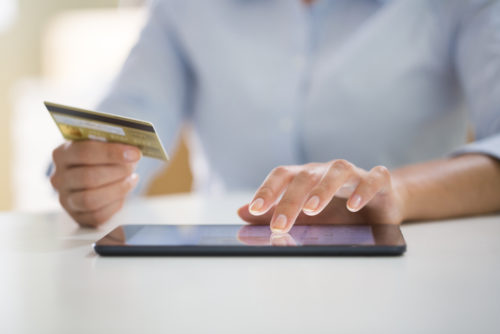Having a credit card and paying your bill on time is a great way to build your credit score. In terms of credit tools, a credit card is one of the most popular used to build a strong financial history. By spending, paying, and keeping your balance low, you can show future lenders that you have the responsibility and financial backing to handle larger loans.
However, a credit card can also be your financial downfall if it’s not used appropriately. Knowing how to pay a credit card bill (and when) is an important aspect in responsible credit card usage.
Table of Contents
How Do I Pay My Credit Card Bill?
The method of payment is up to you, but the key here is to always pay on time, and to avoid carrying a balance. You can pay by bank account, a check, another cash-based method, by mail, or online. You may even be able to use a money transfer. Generally, you can’t use debt financing or another line of credit (like another credit card) to pay your credit card bill, although there are technically loopholes for doing this — if you can handle the associated fees.
How Much to Pay
You should pay the full balance of your card whenever possible. The details of payment and interest should be outlined on your bill, and in your credit card agreement. You can always pay minimums, but this is how you end up paying interest. In order to avoid interest and to begin digging yourself out of credit card debt quickly, keep your payments low and manageable. Spending above your means and always working towards paying off a balance is a slippery slope in credit card use.
Your credit card should never be considered necessary for you to afford something. Instead, look at it as a tool to build credit. By paying your balance and not charging more than you have, your credit score will reflect your efforts.
When Should I Pay My Credit Card Bill?
It goes without saying that you should always be paying your credit card bill, and any other bill, on time. Payment history is a key component of your credit score and even missing one payment can do harm to it.
Before Interest and Fees are Applied
Being on time is one component for paying your credit card bill, but so is paying your bill before interest and fees are applied. Different cards will apply interest at different times, and it’s not always at the same time that your bill is due. Making payments twice a month will help avoid interest and fees, as well as have the added benefit of making your bill easier to handle. Paying your bill late is not only a problem because of the ding to your credit, but you’ll also be hit with late payment fees on top of everything else.
Tips to Help You Pay Your Credit Card Bill
Having a credit card is a great tool for all types of financial backgrounds. Even if you have bad credit or no credit, gaining a credit card and using it responsibly can help improve your history.
Never Carry a Balance
Don’t spend more than you have. It does you no good to spend to your card’s limit unless you have that amount of money readily accessible to pay your balance. Look into your budget and make some spending changes if you find yourself overspending. However, making large purchases on your card can be a smart choice in using your card wisely to earn rewards. The key knowing that you can pay that balance without allowing it to accrue interest.
Set Up Automatic Payments
Automatic payments are a great way to ensure you’re paying your balance on time, every single month, without fail. You usually do this through your bank or through the credit card issuer. Be sure you’re keeping an eye on your payments and other fees. Your payments might not always be the same amount, and interest and fees might be charged on a different day than your due date.
Try to Pay Early Every Month
Paying early is another way to ensure you won’t accidentally pay late, and get a ding on your credit as a result. Avoiding interest is an important aspect in responsible credit card use and paying early is one way to avoid it.
Keep Track of Your Bank Accounts
Treating your credit card like a debit card is a great tactic in using your card wisely. You’d never charge more than you have on a debit card, so utilizing that same principal with your credit card will help to establish a habit of responsible spending. Keep track of your bank accounts and be sure to account for the money you’re spending on your credit card, as well as the amount you’re charging to your debit card.
Getting your first credit card, or learning better credit card habits, involves learning the ins and outs of how a credit card works. Learning how to pay a credit card bill and when is one aspect of that process. Credit card companies have everything to gain from irresponsible use — to an extent — but you have everything to lose from it. Your credit card can be a valuable tool in establishing your financial habits for other lenders, so it’s important to keep track of your spending and pay your bill in a timely manner.
Image Source: https://depositphotos.com/





